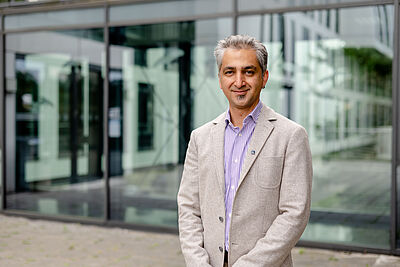The “Conference on Cryptographic Hardware and Embedded Systems (CHES)” is the world's largest and one of the most important international hardware security conferences and will be held again this year from September 18-21, 2022 – for the first time since the Corona pandemic – in presence in Leuven, Belgium.
CASA Principal Investigator Amir Moradi is contributing to a total of eight accepted papers that will be presented during CHES. This means that the new appointed Professor of Implementation Security at Ruhr-Universität Bochum (RUB) since August 2022 can again show a very successful participation in the conference. The focus of the accepted contributions is on design and analysis of hardware implementation of cryptographic primitives protected against implementation attacks. Just last year, Amir Moradi had set a special record in the history of CHES: He was involved in ten of the papers accepted there.
In total, 11 of the 83 papers accepted at CHES 2022 are co-authored by researchers at the Horst Görtz Institute for IT Security and the Cluster of Excellence CASA.
The conference is organized by the “International Association for Cryptologic Research” (IACR) and addresses not only researchers but also participants from industry and government. It is a forum for professional exchange on new methods for secure and efficient hardware implementations and high-speed or leakage-resistant software for embedded systems. CHES was founded in 1999 by CASA spokesman Christof Paar at Worcester Polytechnic Institute in Massachusetts.
The following papers with HGI/CASA participation are accepted at this year's CHES:
- Generic Hardware Private Circuits - Towards Automated Generation of Composable Secure Gadgets
David Knichel, Pascal Sasdrich, Amir Moradi, Ruhr-Universität Bochum, HGI
- Racing BIKE: Improved Polynomial Multiplication and Inversion in Hardware
Jan Richter-Brockmann, Ruhr-Universität Bochum, HGI, Security and Privacy Research, Intel Labs; Ming-Shing Chen, Ruhr-Universität Bochum, HGI; Santosh Gosh, Security and Privacy Research, Intel Labs; Tim Güneysu, Ruhr-Universität Bochum, HGI, DFKI
- Automated Generation of Masked Hardware
David Knickel, Amir Moradi, Nicolai Müller, Pascal Sasdrich,Ruhr-Universität Bochum, HGI
- Cryptanalysis of Efficient Masked Ciphers: Applications to Low Latency
Tim Beyne, Siemen Dhooghe, imec-COSIC, ESAT, KU Leuven; Amir Moradi, Aein Rezaei Shahmirzadi, Ruhr-Universität Bochum, HGI
- Transitional Leakage in Theory and Practice - Unveiling Security Flaws in Masked Circuits
Nicolai Müller, David Knichel, Pascal Sasdrich, Ruhr-Universität Bochum, HGI; Amir Moradi, University of Cologne
- Composable Gadgets with Reused Fresh Masks - First-Order Probing-Secure Hardware Circuits with only 6 Fresh Masks
David Knichel, Ruhr-Universität Bochum, HGI; Amir Moradi, University of Cologne
- Randomness Optimization for Gadget Compositions in Higher-Order Masking
Jakob Feldtkeller, David Knichel; Pascal Sasdrich; Ruhr-Universität Bochum, HGI, Amir Moradi, University of Cologne; Tim Güneysu, Ruhr-Universität Bochum,HGI, DFKI
- VERICA - Verification of Combined Attacks - Automated formal verification of security against simultaneous information leakage and tampering
Jan Richter-Brockmann, Jakob Feldtkeller, Pascal Sasdrich, Ruhr-Universität Bochum, HGI; Tim Güneysu, Ruhr-Universität Bochum, HGI, DFKI
- PROLEAD - A Probing-Based Hardware Leakage Detection Tool
Nicolai Müller, Ruhr-Universität Bochum, HGI; Amir Moradi, University of Cologne
- Multi-moduli NTTs for Saber on Cortex-M3 and Cortex-M4
Amin Abdulrahman, Ruhr-Universität Bochum, Max Planck Institute for Security and Privacy; Jiun-Peng Chen, Academia Sinica, Taipei; Yu-Jia Chen, InfoKeyVault Technology (IKV), Taipei; Vincent Hwang, Academia Sinica, Taipei, National Taiwan University; Matthias J. Kannwischer, Max Planck Institute for Security and Privacy, Academia Sinica, Taipei; Bo-Yin Yang, Academia Sinica, Taipei
- Beware of Insufficient Redundancy - An Experimental Evaluation of Code-based FI Countermeasures
Timo Bartkewitz, Sven Bettendorf, TÜV Informationstechnik GmbH; Thorben Moos, UCLouvain, ICTEAM; Amir Moradi, University of Cologne; Falk Schellenberg, Max Planck Institute for Security and Privacy
General note: In case of using gender-assigning attributes we include all those who consider themselves in this gender regardless of their own biological sex.


